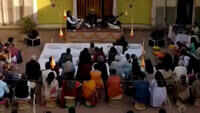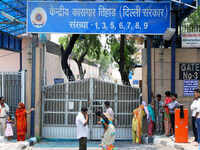Raj not racism behind WW-I Sikh soldier statue defacing?
NAOMI CANTON | TNN | Nov 18, 2018, 23:22 ISTIt is not yet known who defaced the Smethwick Sikh soldier statue, but the monument was never meant to be divisive. It was meant to recognize the significant contribution by Sikhs in WW-I and was promoted by British Sikh MP Preet Gill and built with funds raised from the nearby gurdwara.
“I knew the Smethwick statue would become an issue,” said Jay Singh Sohal, who spearheaded the UK's first WW1 Sikh memorial at the National Memorial Arboretum in 2015. “There is a growing anti-imperial movement among the Sikh youth. Even our statue got politicized. It was quite disheartening. We were worried it would get graffitied.”
On November 9, the Smethwick statue surround was defaced with the words ‘sepoys no more’ and ‘1 Jarnoil.'
Whilst the UK media presumed it was a racist attack and the police decided to investigate as such, deputy chair of City Sikhs Param Singh tweeted screenshots from the UK’s National Sikh Youth Federation (NSYF) twitter account in which “#SepoysNoMore” was the regular hashtag. “Can’t believe someone would use this to desecrate a war memorial,” Singh tweeted.
Whilst denying that any of its members was responsible for the graffiti, NWYF remains vociferously opposed to the Smethwick statue. “As a result of the erasure of Sikh resistance to British imperialism taking place by Sikh representatives, the wider Sikh community has failed to understand why some Sikhs hold grievances, even when this has been so visibly displayed, literally on the statue surround,” the organization told TOI.
“It is sad that the lack of space for critical opinions has forced some Sikhs to protest our own community in this way. It is telling that Sikh representatives are still unwilling to discuss the problematic issues surrounding the glorification of colonial wars and the role played by Sikh soldiers employed by colonists as oppressors,” it added.
Heritage consultant with the UK Punjab Heritage Association, Harbakhsh Grewal, agreed not all Sikhs were in favour of fighting for the British at the time. “In the Punjabi, predominantly Sikh, diaspora in Canada and the west coast of America just before and during the war, the Ghadar Party sought an armed eviction of the British from India. Many returned during that period and used bombing and murder to destabilize Punjab and promote insurrection which led to some units being disarmed,” he said.
“There was also coercion during the war when it came to recruiting Sikhs and other Punjabis, predominantly Muslims, into the army,” he added. But he pointed out an irony. “After the war, many returning servicemen came back with new ideas and a sense of freedom which they had witnessed among the countries they had served in which ironically would have made them more likely to have been amongst those clamouring for freedom from British rule,” he said. “The issue therefore is complex and multifaceted and trying to reduce it, is childish and insulting."
“They are applying their own 21st century prejudices to people who lived a century ago,” commented PIO historian and author Zareer Masani. “The vast majority of Sikhs were loyal to the British Raj during the 1857 Mutiny, which is why the Raj survived, and they later played little part in the independence movement. Why shouldn’t they have supported the Raj if they thought it brought peace and plenty to the Punjab? At least the British gave Sikhs full religious tolerance, lucrative employment and the rule of law. There was no conscription...Their pay enriched the Punjab and helped make it the bread basket of India. Yes, there were Sikh extremists who opposed the war effort and resorted to terrorism, but they were always a small minority,” Masani added.
“These Sikhs died which allowed these British Sikhs to come to Britain and enjoy the freedoms we have. We need to understand why they fought,” Johal said. “If you look at the soldiers’ letters you get a good sense there were benefits and they believed in the cause they were fighting for. You get a sense they were enjoying great freedoms in the West and they did not want to go back. These were farm labourers who had a sense of adventure. We have allowed others to tell their story for too long. We need British Sikhs to research that story and make sense of it for their own community,” he added.
“I knew the Smethwick statue would become an issue,” said Jay Singh Sohal, who spearheaded the UK's first WW1 Sikh memorial at the National Memorial Arboretum in 2015. “There is a growing anti-imperial movement among the Sikh youth. Even our statue got politicized. It was quite disheartening. We were worried it would get graffitied.”
On November 9, the Smethwick statue surround was defaced with the words ‘sepoys no more’ and ‘1 Jarnoil.'
Whilst the UK media presumed it was a racist attack and the police decided to investigate as such, deputy chair of City Sikhs Param Singh tweeted screenshots from the UK’s National Sikh Youth Federation (NSYF) twitter account in which “#SepoysNoMore” was the regular hashtag. “Can’t believe someone would use this to desecrate a war memorial,” Singh tweeted.
Whilst denying that any of its members was responsible for the graffiti, NWYF remains vociferously opposed to the Smethwick statue. “As a result of the erasure of Sikh resistance to British imperialism taking place by Sikh representatives, the wider Sikh community has failed to understand why some Sikhs hold grievances, even when this has been so visibly displayed, literally on the statue surround,” the organization told TOI.
“It is sad that the lack of space for critical opinions has forced some Sikhs to protest our own community in this way. It is telling that Sikh representatives are still unwilling to discuss the problematic issues surrounding the glorification of colonial wars and the role played by Sikh soldiers employed by colonists as oppressors,” it added.
Heritage consultant with the UK Punjab Heritage Association, Harbakhsh Grewal, agreed not all Sikhs were in favour of fighting for the British at the time. “In the Punjabi, predominantly Sikh, diaspora in Canada and the west coast of America just before and during the war, the Ghadar Party sought an armed eviction of the British from India. Many returned during that period and used bombing and murder to destabilize Punjab and promote insurrection which led to some units being disarmed,” he said.
“There was also coercion during the war when it came to recruiting Sikhs and other Punjabis, predominantly Muslims, into the army,” he added. But he pointed out an irony. “After the war, many returning servicemen came back with new ideas and a sense of freedom which they had witnessed among the countries they had served in which ironically would have made them more likely to have been amongst those clamouring for freedom from British rule,” he said. “The issue therefore is complex and multifaceted and trying to reduce it, is childish and insulting."
“They are applying their own 21st century prejudices to people who lived a century ago,” commented PIO historian and author Zareer Masani. “The vast majority of Sikhs were loyal to the British Raj during the 1857 Mutiny, which is why the Raj survived, and they later played little part in the independence movement. Why shouldn’t they have supported the Raj if they thought it brought peace and plenty to the Punjab? At least the British gave Sikhs full religious tolerance, lucrative employment and the rule of law. There was no conscription...Their pay enriched the Punjab and helped make it the bread basket of India. Yes, there were Sikh extremists who opposed the war effort and resorted to terrorism, but they were always a small minority,” Masani added.
“These Sikhs died which allowed these British Sikhs to come to Britain and enjoy the freedoms we have. We need to understand why they fought,” Johal said. “If you look at the soldiers’ letters you get a good sense there were benefits and they believed in the cause they were fighting for. You get a sense they were enjoying great freedoms in the West and they did not want to go back. These were farm labourers who had a sense of adventure. We have allowed others to tell their story for too long. We need British Sikhs to research that story and make sense of it for their own community,” he added.
Download The Times of India News App for Latest World News.








































All Comments ()+^ Back to Top
Refrain from posting comments that are obscene, defamatory or inflammatory, and do not indulge in personal attacks, name calling or inciting hatred against any community. Help us delete comments that do not follow these guidelines by marking them offensive. Let's work together to keep the conversation civil.
HIDE